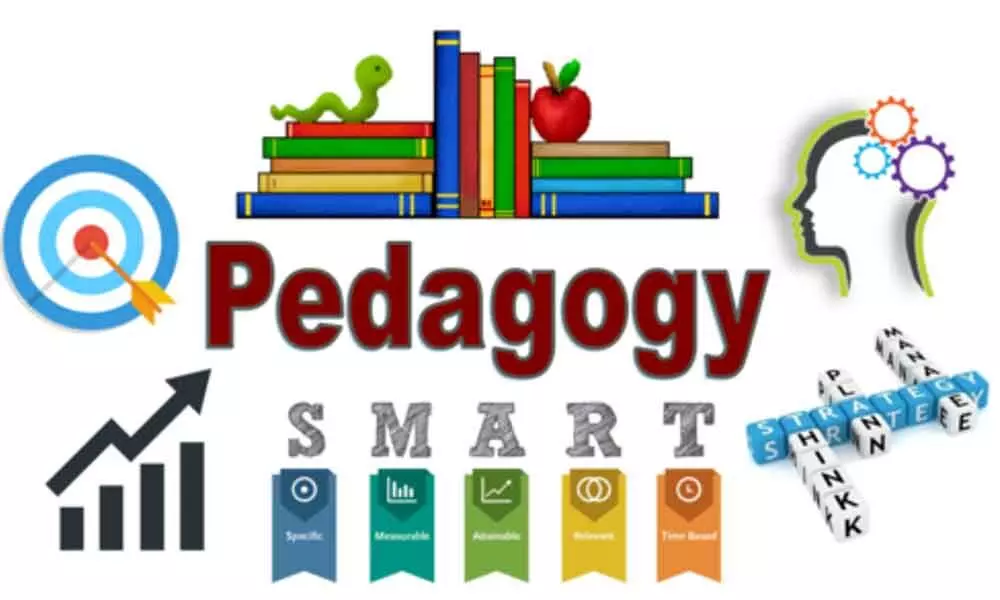Live
- Barring Warangal, 5 airport projects fail to take wings
- KSS unit to be set up in Madakasira
- Narrow roads lead to frequent traffic jams in Kurnool
- Bengal bypolls: TMC leading in all six seats after 2nd round of counting
- Stimulating NREM sleep can boost cognitive function, memory
- EO releases TTD employees’ cricket team Jersey
- Priyanka Gandhi leads by 90,000 votes in Wayanad, Cong edges out BJP in Palakkad Assembly seat
- US CDC confirms H5N1 bird flu infection in child in California
- Dispose dump yard garbage in 3 months: TTD EO
- Gold rates in Vijayawada today surges, check the rates on 23 November, 2024
Just In
Pedagogy in peril, authorities should act fast


Pedagogy in peril, authorities should act fast
The extended holidays to schools and other educational institutions have not only weakened the fundamentals of students and have led to loss of human capital, but also affected the livelihood of the faculty working in private educational institutions
The extended holidays to schools and other educational institutions have not only weakened the fundamentals of students and have led to loss of human capital, but also affected the livelihood of the faculty working in private educational institutions.
As the world is still is waiting for a vaccine for the novel coronavirus disease, many institutions have embraced e-learning to sustain the momentum. But the experience so far has proved that the online classes cannot be a substitute for classroom learning.
E-classes are not able to generate the interaction that is necessary and can be done only when the student is physically present in the school. Another major drawback is that the teachers' body language is also missing in online classes. It should also be noted that there is no uniform policy on e-learning and each State is experimenting in its own way.
While in cities like Hyderabad, e-classes are being conducted by many schools, in Bengaluru, if the students have access to internet, the teacher takes classes online and if not, the teacher has to go to their houses to conduct the classes. The teachers are now going to the houses of students so that they are not deprived of education.
This makes the teachers prone to coronavirus as they have to travel by local RTC buses where no social distancing is maintained. The teachers of government schools are asked to register their attendance in school and go to the houses and take classes and assign homework where a few students sit in groups. Next day, they have to check the homework. If they refuse to do so, they would be suspended.
Even the number of hours of schooling through e-learning has come down to about two hours for the primary classes and another hour or two for the higher classes. This has hampered the education system.
The students not only miss direct interaction with the teachers and fellow students but also badly miss sports and other extracurricular activities likes debates, elocution competitions, seminars, workshops etc. Sitting in front of a laptop or desktop for a few hours is killing their creativity.
Another problem is that while teaching on online platforms has been successful, up to an extent, in urban areas, in rural areas situation is different since they do not have easy access to smart phones or uninterrupted internet connections. Not just that, only non-laboratory-based subjects can be taught online.
This is an unprecedented and unfamiliar situation, and nobody still knows when the situation will be normal. Since educational institutions are most vulnerable for the spread of the disease due to the mass gathering in the classrooms, it may not be possible to reopen them unless, the infection is totally eradicated.
Many private educational institutions have stopped paying salaries to its staff including teachers but are insisting that the parents pay the fees. In universities, research programmes have been affected in a negative way and many a timebound researches have been hit hard by the virus.
The pandemic has not only affected the economy but also 320 million students in the country. Its time a proper policy was worked out. Already two months of academic year has gone waste.

© 2024 Hyderabad Media House Limited/The Hans India. All rights reserved. Powered by hocalwire.com






